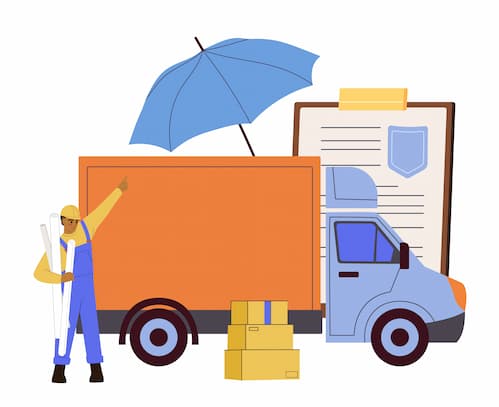- What insurance does a retail store need?
- How much does retail business insurance cost by month and year?
- Factors that affect retail insurance premiums
- Small business insurance companies that serve retail stores
- How to compare retail store insurance companies to get the best coverage
- How to get the best coverage for your small business
- What our expert says
- Frequently asked questions
What insurance does a retail store need?
Several insurance policies cover retail businesses, including:
General liability insurance
General liability insurance covers claims of bodily injury, property damage and advertising injury. This policy covers settlements or judgments, your legal fees and court costs.
Business owner’s policy
A business owner’s policy (BOP) is a bundle that combines general liability insurance and commercial property insurance at a discounted rate. Commercial property insurance covers damage to store inventory and a physical storefront, like displays, floors and windows.
Workers’ compensation insurance
Workers’ compensation insurance covers employees' medical treatment and partial lost wages if they get sick or injured at work. This policy is required in most states for retail businesses with at least one employee.
Umbrella insurance
Umbrella insurance provides excess liability insurance above what your underlying liability insurance policies offer (usually in $1 million increments). It provides additional financial protection against liability claims if a customer gets injured in your store.
Cyber insurance
Cyber insurance covers your financial responsibilities if your business suffers a data breach or is the target of a cyber attack and sensitive customer information is compromised. It pays for things like notifying customers, credit monitoring and your legal fees.

How much does retail business insurance cost by month and year?
Here’s a look at the average cost of retail business insurance by policy type, based on rate data from small business insurance broker Insureon:
| Type of insurance | Average premium per month | Average premium per year |
|---|---|---|
| General liability insurance | $42 | $504 |
| Business owner’s policy | $57 | $684 |
| Workers’ compensation | $90 | $1,080 |
| Umbrella insurance | $75 | $900 |
| Cyber insurance | $145 | $1,740 |
Factors that affect retail insurance premiums
The cost of retail business insurance depends on a variety of factors, including:
- Location
- Type of business
- Number of employees
- Revenue
- Claims history
- Policy type
- Coverage limits
- Deductibles
- Insurance company
Small business insurance companies that serve retail stores
Many reputable insurance carriers sell coverage to retail store businesses, including:
- Nationwide: Nationwide insures many different types of retail businesses, including sporting goods stores, health food stores, florists, gift shops and tailors. In addition to standard retail business insurance coverages, Nationwide offers add-ons like crime insurance, employee dishonesty coverage and utility services coverage.
- NEXT: Retail business owners can purchase comprehensive business insurance through NEXT. The company insures brick-and-mortar retail stores and online stores. You can purchase insurance and make changes to your policy online or through the NEXT mobile app.
- State Farm: State Farm sells a variety of insurance policies for retail store owners, including standard coverages such as general liability insurance, computer property, equipment breakdown, loss of income and sign coverage.
- Travelers: Travelers offers policies including commercial auto insurance, workers’ compensation and cyber liability insurance. Travelers also offers World Business Essentials coverage, which extends your insurance coverage during international business travel.
How to compare retail store insurance companies to get the best coverage
There are dozens of insurance companies that sell coverage for retail store businesses. However, not all insurers are created equal. To find the best retail store insurance carrier, it’s important to compare multiple companies. Follow these steps to find the best insurance company for your business:
- Coverage options: Every retail store business has different insurance requirements. When comparing companies, look at the coverage options available and choose an insurer that offers the types and amounts of coverage you need based on your potential risks.
- Third-party ratings: Third-party ratings can help you better understand an insurer’s customer service reputation and overall customer satisfaction. It’s a good idea to check company ratings from reputable industry organizations, like J.D. Power and the National Association of Insurance Commissioners (NAIC).
- Financial strength: Choose an insurance company that has an excellent or superior financial strength rating from AM Best. Financially stable insurers are able to meet policyholder obligations and pay claims. Companies that aren’t financially strong are at a higher risk of bankruptcy and may have a harder time paying claims.
- Online tools: If you prefer to handle your insurance needs online, look for insurance companies that offer online tools, such as online policy management, online claims, live chat and risk management resources.
- Cost: Before you purchase business insurance, get personalized rate quotes from a few different carriers. This will help you find the cheapest premium for the type and amount of coverage you want.
How to get the best coverage for your small business
Use these strategies to get the best insurance coverage for your business:
- Consider your unique risks: Think about the risks that your business faces based on your industry, services, location and number of employees. Purchase policies that cover the potential risks you face, and choose coverage limits that offer adequate financial protection.
- Find out what coverages are required: Your business might be required to carry certain types of insurance to satisfy local laws, client requirements or lease agreements. Make sure to get the policies you need and provide certificates of insurance to relevant stakeholders, like your landlord.
- Read the fine print of your policy: Every commercial insurance policy has different exclusions. It’s important to read the fine print of your policy so you understand what is and isn’t covered. You might need to purchase other policies or add endorsements to fill gaps in your basic coverage.
- Compare quotes: The cost of business insurance depends on many factors, and some policy types are more expensive than others. Before you purchase any insurance policy, compare quotes from at least a few different insurance companies to find the best coverage at the most affordable rate.

What our expert says
Frequently asked questions
How much is the average insurance for retail store?
The average cost of retail store business insurance depends on many factors, including the policy type, coverage limits and deductibles. Other factors that impact the cost of retail store insurance are your location, claim history, revenue and number of employees. General liability policies range from an average of $40 to $80 a month, while workers’ comp policies cost about $50 to $250 a month.
Why do retail store businesses need insurance?
Retail stores need insurance to protect against potential risks that can lead to financial and legal consequences. Retail store insurance can offer valuable coverage in situations like client injuries and property damage, employee injuries and illnesses, natural disasters, stolen business tools and more.
Do I need commercial auto insurance for my retail store business?
Retail store businesses are required to have commercial auto insurance in most states if the business owns or leases vehicles. A personal car insurance policy doesn’t cover cars that are used for work-related purposes. You must carry a minimum amount of liability insurance, but you can also get full coverage for more financial protection.






